An Italian Wife Read online
Page 15
She hates them, hates dusting them. But this afternoon, the Thursday before her sister’s wedding, Aida likes sitting alone at the top of the stairs, a half-naked man in her lap, a dishrag in her hand, the noise of her loud aunts and uncles and parents and grandmother and great-grandmother all drifting up from below her as she waits for the boy in the white VW to come down the hill.
“Aida!” her mother yells. Her mother only yells. She cannot speak in a normal voice; none of her family can. When one of her aunts telephones her mother, Aida can hear everything she says from across the room. “Aida!” her mother yells again. Then: “That girl gives me agita. Her head is in the clouds all day.”
“She’s a dreamer,” her aunt Gloria says. “Like my Cammie.”
Aida straightens. Her cousin Carmela—Cammie—dreamed of being famous and now she has her own show in Las Vegas. Now she drives a convertible. For all Aida knows, Cammie has met the Rat Pack. All of them. Frank and Sammy and even Dino.
“Cammie isn’t a dreamer,” Aida’s mother says. “She’s a doer. Isn’t she in Vegas? Isn’t she at Caesar’s Palace? You don’t get there by staring out windows.”
Aida catches a glimpse of white in the distance and hears the egg beater engine of a VW. Her heart quickens. She presses her face to the window, feels the tiny squares of the screen denting her flesh. The white Bug comes into view. He drives slowly down the hill, his own car window down, one arm casually draped outside it. As he turns the corner she sees the golden hairs on his chin; he isn’t shaving again. A sign of what? she wonders. Heartache? Laziness? Debauchery? She is not exactly sure what debauchery is, but she imagines it as something sophisticated—a rumpled tuxedo, martinis and cigarettes, late nights. With warm weather finally here, and all the windows thrown open, she can actually hear music coming from his car. She recognizes the song as one her sister, Terry, plays over and over: “Suite: Judy Blue Eyes”: It’s about sadness and regret and loneliness. Oh! Aida thinks. He is heartbroken. She wonders if she can somehow mend him, or if he can mend her. “Yes!” Aida calls out the window. “Yes!”
The car slows. Stops. The boy looks around, as if he’s heard her. He even looks up, right in her direction. But he does not see her there, her face pressed to the window, yearning.
DOWNSTAIRS, THERE IS CHAOS. Noise and chaos. Chicken breasts split open, waiting to be stuffed. Manicotti cooling. Ricotta and eggs being mixed together in Mama Jo’s biggest bowl. Mama Jo herself elbow-deep in ground beef and eggs and parsley and garlic and breadcrumbs. The aunts are sitting, smoking, wrapping candy in yellow tulle and tying the small bundles with white ribbon. Platters of egg biscuits, wine biscuits, wandi fill the counter. Aida feels dizzy from the smells: cheese, smoke, hair spray, powdered sugar, something frying in oil.
“Finally!” her mother says. A cigarette dangles from her lips, the ash twitching precariously above the manicotti. She hands Aida a package of prosciutto, all waxy paper and pale pink flesh. “Roll.”
Aida peels off a thin piece of the ham and pops it into her mouth. She doesn’t chew right away. Instead, she lets the saltiness fill her mouth and nose, the ham dissolve slightly.
Aunt Gloria smacks her on the arm. “It’s for the people!”
Aida swallows. She is immediately thirsty. “I’m a person,” she says, and takes another piece.
Aunt Gloria takes the prosciutto away from Aida, shaking her head. Right away Aunt Connie hands her a platter of fried eggplant. “Go help Aunt Angie,” she says.
The air is blue with smoke. Aida sighs.
“Eh?” Mama Jo says, nudging Aida with her elbow. “I fried all those eggplants myself. My legs are killing me. You know the boy’s family? They don’t peel their eggplant. Tastes sour.” Her face wrinkles up in disgust. “I had to spit it out.”
“The boy” is what Mama Jo calls Eddie, the groom-to-be. He is nineteen years old, skinny, long. Long nose, long hair, long legs. He reminds Aida of Gumby, though she’s never told her sister this.
Mama Jo nudges her again. “You buy eggplant, you always buy the female. Eh?” She wags a finger thick with meatball mixture at Aida. “Female.”
Someone smacks Aida in the back of her head. “Stunare!” her mother says, taking the platter from her. “Why are you just standing here?”
“I don’t care about this stupid wedding,” Aida says, because no one is listening anyway.
It is true. Her sister, Terry, is nineteen years old and works answering phones at Chip Finley’s Ford down the street. Eddie fixes cars there. To Aida, the fact that they are getting married makes her queasy. They should go to South America; they should hike the Appalachian Trail; they should go to college, even junior college; they should learn to cook on a wok, sail a boat, play the guitar. They should do anything but get married and work at Chip Finley’s Ford and stay in this town until they die.
She sees Aunt Gloria stuffing the manicotti.
“Cammie coming to the wedding?” Aida asks, hopeful.
“She’s trying,” Aunt Gloria says. “That girl’s busy. When you’re in show business, you don’t just leave everything. The show must go on, right?”
Aida watches her cigarette bounce as she talks. They are all going to die of cancer, she thinks. Every one of them.
The door bursts open and Terry and Eddie, followed by their best man and maid of honor, practically fall inside. They giggle and hold each other while everyone except Aida beams at them.
“Oh, man,” Eddie says, and heads straight for the cookies. He pops them in his mouth whole, one after another.
“Save some for the people,” someone says.
Eddie laughs and tosses a few cookies to Frankie, the best man.
“Wow,” Terry says, slowly surveying the room. The food, the relatives, the tiny bundles of dressed-up candy. “Someone getting married?” She laughs hard at her own joke.
Aida glances at the cuckoo clock on the wall. Her father bought it in Germany when he was in the Navy, and it is the one thing of all the souvenirs he bought that she likes. She does not know anyone else with a cuckoo clock. It seems exotic and fancy. While she looks at it, admiring the carved scene of birds and trees, the ivory face, the cuckoo shoots out and jerkily cuckoos once. It is five thirty. Hours before Dean Martin comes on. She plans on hiding in her parents’ bedroom to watch it on the portable television in there.
Terry has kissed everyone hello, everyone except Aida. She wraps her skinny arm around her and kisses her cheek.
“Hello, little sister,” she says.
Her eyes are red and heavy lidded. Aida smells the too-sweet smell of marijuana, which is what Terry and Eddie do in their spare time. Aida found them behind the garage last fall, and threatened to call the police. It was illegal. It led to harder drugs, like heroin. But Terry had grabbed her arm hard and said, “Keep your fucking mouth shut, Aida. If you’re a good little girl maybe we’ll give you some.”
“I don’t want drugs!” Aida had said, horrified.
Ever since then, she’s caught them smoking it in the car, in the basement, even in Terry’s room with a blue bath towel—one of the good ones—rolled under the door. It is all that they do, and it makes Aida alternately sad and angry. For her bridal shower, she bought her sister a book called Wok Cookery, believing that maybe if she found something new, something she liked, she wouldn’t have to get high all the time. “Wow,” Terry had said in her thick stoned voice when she opened it, “Chicken with Cashews.”
The phone rings and Aida runs to answer it.
She hears static and then, “Auntie Anna? Auntie Anna?”
“This is Aida,” Aida says.
“Little Aida? It’s Cousin Cammie.”
Aida puts a finger in one ear to hear better. She imagines this voice cutting through the hot desert air, traveling across mountains and rivers and cities to her ear.
“Cammie!” Aida says it like a sigh.
“Listen, doll,” Cammie says, “I’m on my way. I think I’ll be able to make it in tim
e for the wedding. If I drive straight through.”
“What?” Aida says. “You’re driving?” Why wouldn’t someone in show business fly from Las Vegas?
“I’ve got my little red convertible, my cooler filled with ice-cold Fresca. It’s heavenly,” Cammie tells her.
“Okay,” Aida says.
“I’m scared of flying anyway. Did you hear about that Eastern Airlines plane that crashed in some lake near New Orleans?”
“Uh-huh,” Aida says, though she has not heard of any such thing.
“No thank you,” Cammie says.
There is a strange sound, then the phone goes dead briefly.
“Out of change, babe,” Cammie says before it goes dead again.
Suddenly Aida has something to look forward to. Maybe she can go back to Las Vegas with Cammie. Maybe she can be her assistant. Aida smiles, hugging herself. Her mother is yelling to her: “Aida, get your skinny ass in here and help.” But Aida doesn’t move. Instead, she stands alone with her good news.
AIDA WONDERS IF Cammie knows Jeannie, Dean Martin’s beautiful blond wife. Last night he said, “Jeannie, baby, don’t wait up,” and Aida got goose bumps. She imagines Jeannie in a sleek modern house with white furniture and a big stone fireplace and, outside, a piano-shaped swimming pool. Some movie star has a pool like that, she just can’t remember who. If she were Jeannie, she would wait up. She would spray on Jean Naté and wear a little babydoll pajama set like the one Terry got at her bridal shower. Her goose bumps rise up again, all along her arms.
ON HER BEDROOM DOOR, wrapped in plastic, hangs her ugly yellow chiana junior bridesmaid’s dress. Terry thinks it is sophisticated, but to Aida it looks like a cheap prom dress. Her sister’s dress is also chiana—white, even though she isn’t a virgin. Aida stares at the dress, hating it.
Downstairs: noise. They are getting ready for the rehearsal at the church, and then the dinner here afterward. Eddie’s entire family is coming. They don’t peel their eggplants. They put a crust on their Easter pastera. They don’t do anything right.
“Aida!” her mother yells.
Aida sighs and gets off the bed. Her body weighs three tons. The rehearsal dinner dress sticks to her in the early summer heat. It is black and covered with bright-yellow sunflowers, like a tablecloth. It seems the role of a junior bridesmaid is to be humiliated so that the bride shines. In Las Vegas she will wear bikinis and cover-ups in lime green and hot pink. She will smell of baby oil and iodine, like the older girls at the beach. This idea makes Aida smile as she goes down the stairs, past all of her father’s ugly souvenirs.
The souvenirs are all they have left of him. When she was six, there was a blizzard and school got canceled. Her father went out to shovel the snow and died of a heart attack, just like that. Boom! No warning. To Aida, he is just Old Spice and Vitalis, a scratchy wool sailor’s uniform, a pile of worthless figurines and clocks and colorful money from faraway places. Sirens still make her feel like she can’t breathe. Snow days still make her sad.
“The Queen of Sheba,” her mother says. “Finally.”
Terry’s rehearsal dress is short and yellow with a matching bolero jacket. She looks like a jaundiced matador.
“You’re all wrinkled,” Aunt Connie says, disgusted.
Aida shrugs. Her great-grandmother, Mama Jo, pulls her aside and whispers harshly in her ear. “If those people bring any food into this house, don’t eat it. You hear me?”
“All right,” Aida promises.
Mama Jo pinches her arm. “Don’t eat it,” she says again.
People are gathering their matching purses—yellow, blue, red. They primp their hair and twirl their lipstick from their cylinders, the poppy and crimson and coral emerging.
“Let Aida wear some,” Aunt Gloria says.
“No!” her grandmother, Mama G, says. “She’s a little girl. She’ll look like a puttana!”
“Don’t be ridiculous,” Aunt Gloria says, coming at Aida with her hot-pink lipstick wielded like a sword.
Aida steps back. No one wears this thick matte lipstick anymore. Girls her age wear plum-flavored lip gloss or Yardley Good Night Slicker all pale pink, almost white. “That’s okay,” she says.
But Aunt Gloria grabs her shoulders and holds her in place, then smears lipstick across her bottom lip. It’s oily and tastes like crayons.
“Do this,” Aunt Gloria tells her, and presses her own hot-pink lips together.
Aida does the same, miserable.
“Look at you,” Aunt Gloria says, grinning, her breath sour with cigarettes and Mama Jo’s homemade wine. “Your whole face opens right up.”
“Hey,” Aida says. “Any word from Cammie?”
“She called from Chicago,” Aunt Gloria says. “Who knows? She might just make it. You know she could have flown to Paris, France, with Howard Hughes but she said no, I got to go to my cousin Teresa’s wedding.”
Aida frowns. “But she’s afraid to fly, right?”
Already, Aunt Gloria has grown bored with her. She blinks her heavily mascaraed eyes and yells, “Terry! You need a little lipstick, honey.”
From somewhere in the distance, Aida hears a bell ring, muffled amid the shouting. She listens until she hears it again. Someone is at the door. Cammie, she thinks. She wants to open it, to see Cammie first. Maybe she can talk to her right away about leaving with her. Maybe they can make a plan.
Aida opens the front door and gasps. Standing right there, inches from her, is the boy in the white VW Bug. His nose is sunburned and he looks hot in his heavy blue jeans and army-green pocket T-shirt.
Immediately, Aida covers her mouth with its hot pink lips. She is meeting the second love of her life wearing an ugly dress covered with too-bright sunflowers and hot-pink old-lady lipstick. She considers closing the door and running upstairs. But it’s too late. The boy is talking. At least, his lips are moving but Aida seems to have gone deaf. She can’t hear anything except a buzzing in her ears.
The boy points to his car, which is parked on the sidewalk in front of their house, almost exactly in the spot where her father dropped dead.
Her hearing slowly returns. From behind her comes the sound of her mother yelling, “Is someone at the door?”
The boy is frowning at her. “Your phone? Okay?”
Somehow Aida makes sense of this. The car is broken down. He needs to call somebody.
Stupidly, she nods. She wants to tell him that she is not like the people he is about to meet. That she never wears ugly dresses with bright sunflowers or pink lipstick. I am not who you think, she screams in her head. But all she does is step aside and let the boy in. As he passes her, she catches a whiff of something familiar, but she cannot name it.
“Close the door!” her mother yells. “You’re letting the bugs in.”
Aida lets the screen door slam shut behind her. She sits on the front steps, trying not to cry.
“Get up!” Mama Jo yells through the window. “You’ll get piles sitting on the cement like that.”
“I don’t care,” Aida mumbles. She feels the weight of loss heavy on her chest. The boy will never love her. He will think her foolish and ugly and unlovable. His car sits neglected in front of her. Aida imagines all the snow that fell that day her father died. When her mother found him, she screamed so loud that Aida ran to the upstairs window to see what was wrong. Far beneath her, her father lay in the snow, his rubber boots black against it and her mother kneeling beside him in her pale-pink rubber curlers and green chenille bathrobe. They looked small from where Aida stood, like dolls.
Slowly, Aida gets up and walks over to the boy’s car. She opens the door and gets in the passenger’s side. The car smells like sweat and something else. She inhales. Marijuana. The whole world is stoned, Aida thinks, that weight pressing on her even harder.
Crickets sing in the evening air. Soon, people start filing out of the house, a flurry of bright colors under the streetlight. The boy gets in the car and looks at her.
“U
h,” he says. “I’ve got to wait here for the guy with the jumper cables.”
Aida nods.
“Your mother said it’s okay,” he adds.
Her name pierces the still air: “Aida!” her mother yells. “Aida!”
The boy leans across her and goose bumps rise on her arms and legs and neck. He opens the door and without a word, speechless, dumb, Aida climbs out and follows the sound of her mother’s voice.
SHE LIVED THROUGH IT. The rehearsal at the church, walking down the aisle on the arm of Eddie’s stringy-haired brother Billy, again and again; the dinner afterward with Eddie’s family not eating her family’s food and her family not eating theirs; the wedding itself, the church so hot Mama Jo had to be taken out for air; Phyllis Cardi singing “Sunrise, Sunset” slowly and off-key; her sister stumbling when she climbed the three steps to the altar; the suffocating smells of flowers and wax and perfume; the boring priest; the boring ceremony; the flurry of joy when Eddie and Terry emerged from the church and everyone threw rice at them and snapped photographs. She lived through it all in her yellow chiana gown and dyed-to-match sandals.
Somehow, by the time they get to Club 400 for the reception, Aida feels let down, as if she had expected more, or at least expected something. Whiskey sours flow from a fountain and platters of greasy hors d’oeuvres swirl around her. The banquet hall, with its heavy maroon drapes and chairs is funereal, Aida thinks. The pale-yellow tablecloths and napkins against the dark maroon make her seasick and she steps outside.
In the parking lot a woman gets out of a red convertible and teeters toward Aida on turquoise high heels.
Aida steps into the sunlight and squints. “Cammie?” she says.
Her cousin’s hair is so big and platinum blond that Aida can only think of Jayne Mansfield. When Cammie left she had wavy brown hair. Now she is a person under a big bubble of blond hair.

 Kitchen Yarns
Kitchen Yarns Waiting to Vanish
Waiting to Vanish Morningstar
Morningstar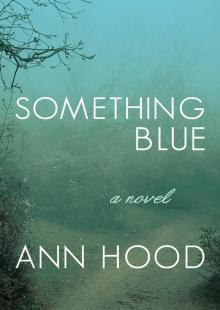 Something Blue
Something Blue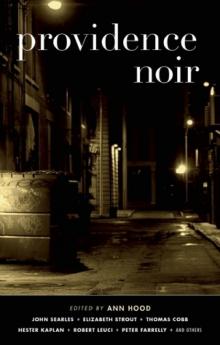 Providence Noir
Providence Noir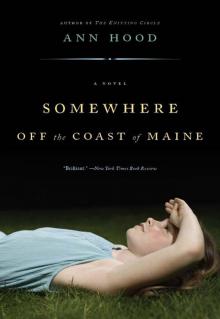 Somewhere Off the Coast of Maine
Somewhere Off the Coast of Maine Jewel of the East
Jewel of the East Queen Liliuokalani: Royal Prisoner
Queen Liliuokalani: Royal Prisoner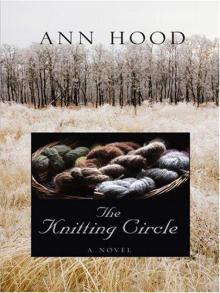 The Knitting Circle
The Knitting Circle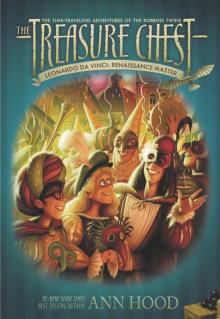 Leonardo da Vinci: Renaissance Master
Leonardo da Vinci: Renaissance Master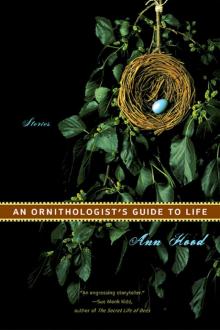 An Ornithologist's Guide to Life
An Ornithologist's Guide to Life The Red Thread
The Red Thread She Loves You (Yeah, Yeah, Yeah)
She Loves You (Yeah, Yeah, Yeah)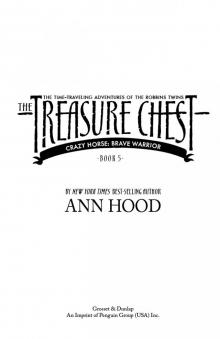 Brave Warrior
Brave Warrior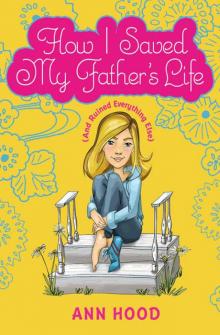 How I Saved My Father's Life (and Ruined Everything Else)
How I Saved My Father's Life (and Ruined Everything Else) An Italian Wife
An Italian Wife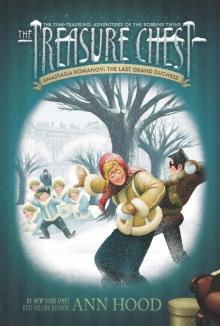 Anastasia Romanov: The Last Grand Duchess #10
Anastasia Romanov: The Last Grand Duchess #10 Prince of Air
Prince of Air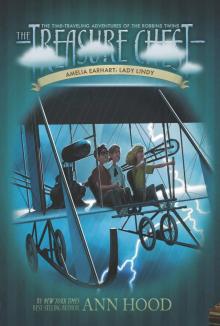 Amelia Earhart: Lady Lindy
Amelia Earhart: Lady Lindy Places to Stay the Night
Places to Stay the Night Little Lion
Little Lion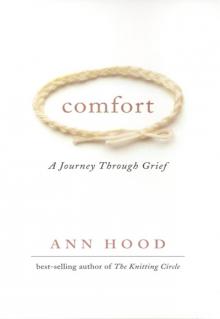 Comfort
Comfort Angel of the Battlefield
Angel of the Battlefield